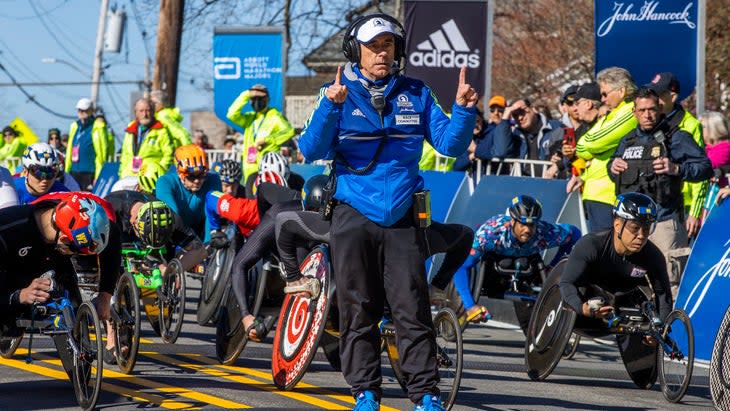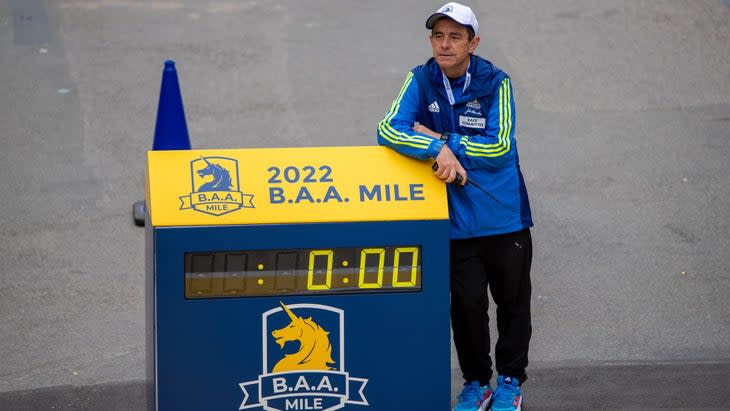Dave McGillivray Has Finished the Boston Marathon 50 Times. He’s Still Going Strong.
- Oops!Something went wrong.Please try again later.
This article originally appeared on Outside
This article is part of Outside Run's complete 2023 Boston Marathon race coverage.
Fifty years ago this week, after finishing the Boston Marathon for the first time, Dave McGillivray vowed to run it for the rest of his life.
A lot has changed since 1973--especially the Boston Marathon, which had just 158 finishers that year, compared to the 30,000 lining up on Monday--but McGillivray has so far remained true to his word, both out of the pure joy and satisfaction he gets from running the hallowed race, but also out of respect to his late grandfather.
The fact that this hardscrabble, 68-year-old Bostonian has 50 consecutive Boston finishes under his belt--and continues to run after having triple bypass surgery a few years ago--borders on incredulous. But it still doesn't tell half the story about his long and passionate connection to America's most beloved running race, or about his personal accomplishments in endurance sports.
Aside from running the 26.2-mile race from Hopkinton to Boston, McGillivray has given blood, sweat, and tears to the race during three and a half decades serving as one of its principal directors. Initially hired by the Boston Athletic Association (B.A.A.) as a technical director in 1988, he took on the role of race director in 2001, and now serves as the course director--although he's always insisted his role has been that of a caretaker, a steward who nobly helps guide the race with a mix of working class diligence, selflessness, grace, and respect.

As a race director, he's known for his smarts, experience, and meticulous attention to detail. As a runner, McGillivray's biggest talent has always been his work ethic and consistency. He was never an elite athlete, though he did manage to lower his personal best to 2:29:58, while training with the Greater Boston Track Club that produced legendary elite runners and Boston champions Jack Fultz, Bill Rodgers, Alberto Salazar, and Greg Meyer.
"He is first and foremost a runner, and he’s been a runner all his life. Boston is full of championship runners, and Dave’s not one of them," says Amby Burfoot, a longtime friend of McGillivray and the 1968 Boston Marathon champion. "But he’s an absolutely dyed-in-the-wool, true New England runner and Boston Marathoner."
In his own way, McGillivray's longevity and dedication to serving the race has already made him as much a part of the Boston Marathon's storied history as many of its past champions and race officials. At some point, history should embrace him alongside legends like John A. Kelley (a.k.a. The Elder), a two-time U.S. Olympian who started 61 Boston Marathons and finished a record 58 between 1928 and 1992--a span that included victories in 1935 and 1945, and 15 top-five finishes from 1934 to 1950--and John J. Kelley (a.k.a. The Younger), also a two-time Olympian who ran Boston 32 times, won it once (1957), and broke the three-hour barrier into his 50s.
A Lifelong Pledge
Beyond marathons, McGillivray has been a consummate endurance fiend, part of the first generation of age-group athletes who relentlessly pushed their limits with gusto. That included competing in the Hawaii Ironman Triathlon numerous times, starting with the second one held in 1980, when swim-bike-run events were in their infancy. In all, he has nine finishes in Hawaii, most recently in 2014.
As much as he pursued his own goals, he realized long ago that his athletic prowess could become a vehicle for good, and that he had the heart to make it happen. He became a pioneer of the running-for-charity movement, starting with his 3,452-mile run across the U.S. in 1978 that raised money for the Jimmy Fund, an organization that supports research toward eliminating cancer in children.
His endurance events for charity are legendary, including running 120 miles in 24 hours through 31 Massachusetts cities; an 86-story, 1,575-step run up the Empire State Building in 13 minutes and 27 seconds; and running, cycling, and swimming 1,522 miles through six New England states while raising money for the Jimmy Fund. He repeated his transcontinental run in 2004 with a team of veteran endurance athletes, this time raising money for several charities benefiting children.
But the Boston Marathon has always been closest to his heart.
It all started because of a promise he made to his grandfather, when, as a high school senior, he was eager to run the race. His grandfather, who lived near the course, pledged to meet him at Coolidge Corner, near the 25-mile mark. As the story goes, McGillivray, overly ambitious and undertrained, dropped out of the race near mile 20 in the Newton Hills and was taken to the hospital because he was severely dehydrated. It wasn't until much later that evening when he finally reached his grandfather by phone and found out he waited for him for hours.
His grandfather encouraged him to diligently train for the race the following year and, if he did, he'd once again be waiting for him. McGillivray took the challenge, but his grandfather died the summer before the next Boston Marathon.
McGillivray entered the race but struggled again and stopped at mile 21.5. He was ready to quit when he realized he was a stone's throw from Evergreen Cemetery, where his family had buried his grandfather only months earlier. That gave him a spark to get him moving again. Once he crossed the finish line, he swore he'd run the Boston Marathon for the rest of his life, in part, to honor his grandfather.
McGillivray registered and ran 16 straight Bostons until he began working the race in 1988. After he was done with his race-day duties that first year, despite being exhausted after a long day working on the course, he faced the dilemma of summoning the energy to run 26.2 miles. He asked a police officer if he could get a ride back to the start.. "He asked me, 'Did you forget something out there?'" McGillivray says. "And I said, 'Yeah, I forgot to run it.'"
Since then, he's been a part of everything Boston. He was there when Ibrahim Hussein became the first Kenyan to win the race in 1988, which ushered in the dominance of East African runners in Boston. He played an integral organizing role in the race's 100th anniversary, in 1996, which had a then-record 36,000 entrants. He was also a key player when the B.A.A. hosted the 2008 women's U.S. Olympic Trials Marathon the day before the Boston Marathon.
He was there in 2011 when Geoffrey Mutai rode a tailwind to an astonishing new course record (2:03:02), and when Kenya's Rita Jeptoo became the first woman to break 2:20 three years later--only to have her victory and course record erased when she was busted for doping.
And then, of course, there was 2013, when terrorist bombings killed three people and injured more than 280 runners and spectators. On that day, as per usual, McGillivray had finished his race directing duties and had checked in with all of his course ops people to make sure everything was going smoothly before heading back to Hopkinton to run the course for the 41st straight year.
When he got a call about explosions on Boylston Street, the first thing he thought about was his family, who had been situated in the finish line bleachers. They were OK, but they had seen it all happen. McGillivray's youngest son, Luke, was eight years old at the time, the same age as Martin Richard, the boy who was killed by one of the blasts.
Aside from doing his part to foster the ensuing Boston Strong sentiments that helped rally the city, the running community, and the race, McGillivray also dedicated his races in Richard's memory for the next five years, raising money for the Martin Richard Foundation and starting the MR8K road race in Boston.

The spring of 2013 was a rough time around Boston, but he eventually returned to run the course several weeks later, both to keep his streak alive but also to immerse in his love of Boston, the race, and the running community. It took months before race planning could begin amid investigations and new safety protocols that were developed, but the 2014 race went off without a hitch, capped off by Meb Keflezighi becoming the first American man to win in 31 years.
"I have a motto in my life: the comeback is always stronger than the setback," McGillivray says. "And that’s exactly what we experienced after that day. It's more than just never forgetting. It's about always paying tribute to those who are profoundly impacted by the bombing while, at the same time, trying as much as possible to get back to putting on the best road race, the best marathon in the world."
In the past 10 years, McGillivray has been there for record heat, horrific cold, rainy weather, and, of course, Des Linden's historic 2018 win, as well as the challenging impacts of COVID-19. In 2020, when the race was canceled because of the pandemic, McGillivray initially logged 26.2 miles by running laps around his neighborhood, then ran the virtual race the B.A.A. organized. He eventually ran the actual course, too. Not because he was looking for attention, but because that's what he does.
Holding the Spirit of Boston
What McGillivray represents is a bridge between the simple times of the original running boom of the 1970s and the more complicated modern times of mass participation. The experience and history that comes along with his considerable body of work--both as a race director and as an endurance athlete--is worth its weight in gold. He's been instrumental in the marathon's success and evolution, especially amid the growing interest, the many changes of the running community, and the challenges the race has faced in the past decade, Burfoot says.
"He’s an organizational genius who has an absolutely bottomless love for running, and especially the Boston Marathon," Burfoot says. "It has been a shining light in his life, and he has reflected back on it brilliantly. I think the spirit of Dave McGillivray is very, very much the spirit of running, and of the Boston Marathon, and I feel so thankful that we had him as such a key player for all these years."
For the past 35 years, McGillivray has continued to run the Boston Marathon on his own--or with a group of supportive friends--after his race-day work is finished. That has typically meant finding his way back to the start long after most runners have reached the finish line and then running back into Boston in the dark. This year, the B.A.A. has told him his duties will end sooner, just after the elite runners have finished around noon, so he's planning to change into running gear and get a ride to Hopkinton by early afternoon. If all goes as planned, he could run to the finish on Boylston Street in daylight for the first time since 1987.
But McGillivray is smart and knows that time waits for no one, and with time comes change. As much as he wants to run the Boston Marathon for as long as he can, McGillivray is candid enough to admit that he won't be working for it forever, despite his limitless enthusiasm to do so. He expects to be with the organization for at least another year, and then, who knows?
"We'll see what happens after that," he says. "But I'll still run the race. If I'm not working it, I’ll register like everyone else and run the race like everyone else. That’s what I do every Patriots’ Day. It's what I do."
For exclusive access to all of our fitness, gear, adventure, and travel stories, plus discounts on trips, events, and gear, sign up for Outside+ today.

